Ariana Ahmed
Final Essay
Professor Hernández-Ojeda
HONS 2011J – Spanish Civil War in Literature and Film
Personal Statement
In step with a majority of the class, before enrolling in HONS 2011J – Spanish Civil War in Literature and Film, I had no understanding of what the Spanish Civil War was, why it was fought, and what it symbolized in a global context. As we dived into the material, I soon understood that the common cause of the Spanish Civil War was fascism; the Nationalists wanted to bring glory to the Spanish Empire and nationalism through fascist means, while the Republicans laid their lives out on the line to protect the freedom of their mother country. Either way, both sides needed fighters that were passionate for their cause, and that is how I discovered Mosess “Moe” Fishman, who fought with the Abraham Lincoln Brigade, the American comrades of the Republicans. Fishman’s New York roots and bravery shone through his biography, and this deep research into his background, who he was before, during, and after the war, only goes on to solidify his status as a victor of the Spanish Civil War, despite which side actually won the war.
On a more personal note, as I read his biography, interviews with radio shows, testimonies from his family, it felt like I had already met Moe Fishman in the past. This is because my grandfather is also a veteran of war – the Bangladeshi Liberation War of 1971 – and embodies parts of who Fishman had become as a result of his involvement with the Spanish Civil War. As a parallel, while my grandfather was never given the vocabulary to understand the western notion of fascism, he definitely saw it happen right before his eyes. His main reason to enlist in the liberation war was to fight back against Pakistan’s fascist and authoritarian oppression against the region of Bangladesh, formerly known as East Pakistan. Decades ago, Fishman and my grandfather both embodied the nationalism, bravery, and loyalty of the same veteran as they both enlisted as a promise to prevent fascism in a country they loved so much.
Brief Introduction to the Spanish Civil War
The Spanish Civil War, waged between 1936 and 1939, was one of the defining wars of the 20th century. The war was initiated by anti-democratic nationalists, led by Generalissimo Francisco Franco, and in opposition of the Republicans and their allegiance to the democratically-elected government. The dispute has drawn international interest as an ideological dress rehearsal for the Second World War on the horizon. The Nationalists have been sponsored by the Fascists—Germany Hitler’s and Italy’s Mussolini. The Western democracies, split and divided by the loyalists, have kept their distance from the Communists. Many similar faith citizens did not stop supporting the loyalist cause. The original effort of armed rebels to take over Spain, trying to revert to the old order of control and
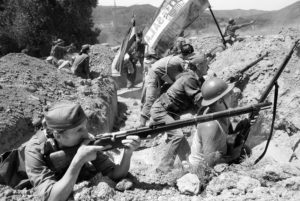 Republican soldiers at the Battle of the Ebro, July-November, 1938 (Military Reviewer).
Republican soldiers at the Battle of the Ebro, July-November, 1938 (Military Reviewer).
wealth developed into a three-year-long war that martyred thousands. Despite being such a pivotal and globally broadcasted war, the intricate and intimate aspects of the Spanish Civil War and its impact on the lives of those who enlisted, the Spanish, and victims of fascist aggression remain uncovered. Amongst all this, Fishman’s story is seen as a fractional yet vital part of who exactly was involved in a war such as the Spanish Civil War; Fishman’s involvement allowed his history to be recorded and scholars in the present day to analyze all the missable yet crucial factors that influenced commoners such as Mosess Fishman to readily give up their life so that Spain could have her freedom. Simply put, details in Fishman’s life provide a clear indicator to his eventual enlistment in the war in the larger debate that surrounds the topic of why these people joined a fight that was not theirs, inherently.
Who Is Mosess “Moe” Fishman?
At this moment, if one googled Mosess “Moe” Fishman, it would give them the following information: Mosess “Moe” Fishman was a New Yorker from Astoria, Queens, and he battled fascists in Spain when he enlisted in the Abraham Lincoln Brigade. He got severely injured by a sniper, and after returning home, led veterans of that unit in battling endeavors to mark them as Communist subversives. He died of pancreatic cancer at 92 in August of 2007. Mr. Fishman is now survived by his life-partner, Georgia Wever, and his sisters Lilly Litsky, of Santa Cruz, Calif., and Pearl Fishman (“Moe Fishman, Lincoln Brigade Veterans Leader, 92 | Amnewyork”).
However, those who know, or will soon know the story of Moe Fishman will realize that there is more life, bravery, and charisma to this veteran of the Spanish Civil War than what any news article of public information can express. Too often, these generic descriptions focus on the life, middle, and end of these heroes, but fail to address the details that led them to their momentous actions and decisions. Through the time I’ve spent researching the Spanish Civil War and my volunteer, Fishman, I’ve been able to come up with a more introspective and intimate look into who Fishman really was, before, during, and after the war. According to my research, Mosess “Moe” Fishman, born in New York in 1915, was a member of the Youth Communist League, was initially refused when he volunteered for Spain, for lack of military experience. However, his experience as a truck driver was later taken into account, on the condition that he would provide a contingent of about ten volunteers. This was done. He lost a leg very quickly after his arrival. When he returned to the United States, he devoted himself to helping Spanish refugees. In 1950 he became secretary and treasurer of the VALB, known as the Veterans of the Abraham Lincoln Brigade, after the collective resignation of its board of directors following the enactment of the McCarran Act, which required all organizations designated as subversive to register with the federal government, while providing for heavy penalties for those who refused to cooperate.
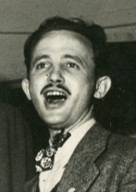 Mosess “Moe” Fishman at age 21. https://alba-valb.org/volunteers/mosess-moe-fishman/
Mosess “Moe” Fishman at age 21. https://alba-valb.org/volunteers/mosess-moe-fishman/
Fishman’s Life Before the War
In 1937, Fishman was a Stuyvesant graduate working in his father’s laundry business and operating a truck to earn an income. He was also set to be a CUNY graduate from City College, before he had to drop out due to financial burdens, and opted to work in his family business instead. He was additionally an individual from the Young Communist League, having joined somewhat to meet similar young minds, he said in a meeting with The New York Times in 2004 (Martin). He likewise enjoyed how the Communists reacted when a family behind on the lease was removed and tossed in the city with its furnishings. He disclosed to the New York Times newspaper that party individuals would utilize a hatchet or mallet to break the lock on the entryway and set the family back in (Martin). Even in his earliest days, Fishman knew between right and wrong when it came to human rights; his obligation to provide a family with their human right and claim to shelter overcame the consequences of destructing private property. These missable but significant details from his life are what provides us insight into why he fought in the war, as at that point, it is to be expected – of course, a man who believed in a family’s human right to housing would fight in a war that would guarantee the people of Spain to live in their mother country without being under an authoritarian regime.
In 1936, the Spanish Civil War commenced when Gen. Francisco Franco set out to oust the democratically elected left-leaning government. Americans before long enlisted to challenge Franco international comrades of the Republicans, in what came to be known as the Lincoln Brigade. The two American legions, which casually have come to be known as the Lincoln Brigade, got together with four different legions of volunteers from different nations to shape the XV International Brigade.
Many accept that in any event that half of the volunteers for the Lincoln Brigade were communists, however, Mr. Fishman’s purposes behind joining were considered more unpredictable. He was conceived as Mosess Fishman on September 28th, 1915, and experienced a standard childhood in Astoria, Queens. On the day he was to enlist for Spain, midway down the steps, he remembered that he had forgotten his toothbrush, returned for it, and broke it half so it would fit in his pocket, which was the only thing he brought back with him from Spain, he mentioned in an interview once (Martin).
As a personal anecdote, Mr. Fishman spoke of the time he called his parents as he got off the subway close to the dock, and they burst into tears when he announced his plans to fight in the Spanish Civil War. This was the first time his mother saw his father cry, but he himself was unafraid as he was overcome by a sense of duty to fight fascism. “At the age when you’re 21, there’s no bullet meant for you,” he stated in an interview to The Times in 2000 (Martin).
Missed Details From The War
On July 5, 1937, during the Brunete battle in the west of Madrid, an expert rifleman hit Mr. Fishman in the thigh, leaving him temporarily immobile and with 32 bits of bone and metal in his leg. Due to this, he went through a year in Spanish emergency clinics, and a pin was placed into his leg. At a certain point, the leg got contaminated and had to be amputated (“Fishman, Moses | The Abraham Lincoln Brigade Archives”). He was then transferred through multiple clinics in the United States for a long period of time. Mr. Fishman had the occupation of a trader marine in World War II. Subsequently, he and other Lincoln veterans got engaged with helping outcasts from Franco’s Spain. President Harry S. Truman’s attorney general named the veteran’s gathering incendiary. At whatever point any of them as yet living American veterans of the Spanish Civil War volunteers passed on, it had been the employment of Mr. Fishman, as chief secretary-financier of the veterans, to report their demises. He never burnt out on a live exhibit. In any case, he came to favor sitting in a lawn seat, as he did in 2004 when he hailed dissidents at the Republican National Convention in Manhattan. At the point when they saw his Lincoln Brigade standard, they commended back.
After The War
After coming back to New York and the board’s resignation following a crackdown on socialist ideals, Moe Fishman was given the responsibility of being a secretary to one of the most active American branches in support of an anti-fascist Spain, the Veterans of the Abraham Lincoln Brigade. To exemplify his role as secretary, Moe Fishman kept the Veterans of the Abraham Lincoln Brigade going, generated hundreds of issues of The Volunteer, the brigade’s newspaper, rallied solidarity for progressives’ strides against fascism globally, and acted as the face of the Veterans of the Abraham Lincoln Brigade, representing the association and their mission wherever he went.
Fishman also assisted in commemorating the memory and passion of the war into art through partaking in the creation of music that reflected on why the war was fought, and how it meant to inspire people in the present and in the future. “Six Songs for Democracy” is a combination of songs that expressed a longing for democracy, was originally recorded in Spain in June 1938, during a Nationalist-led air raid on Barcelona. It was released in the United States by Keynote Recordings in 1940, and saw growing success, and hence, was followed up by American recordings of Spanish Civil War, into a segment known as “Songs of the Spanish Civil War”, also known as “Songs of the Lincoln Brigade”, published by Smithsonian Folkways Recordings.
Composed by Moe Fishman, the initial five songs in the “Songs of the Abraham Lincoln Brigade” was assembled and presented as a keepsake for Fishman and the other veterans of the International Brigades who attended the centennial celebration of the battle in Berlin in the year 1961. In the notes, Fishman explained why songs needed to be re-highlighted: “From the original recordings these songs of the past magically re-created an atmosphere of readiness for combat, hatred for the fascists, and love and longing for the distant homeland” (Glazer). In part two, which is aptly named “Songs We Remember,” the American volunteers’ adoration and desire to fight for Spain is evoked, in a final attempt to protect Spain’s people and culture. “We remember a land where the hope of freedom mingled with the soft fragrance of the orange blossoms and the smell of gunpowder,” Moe Fishman penned in the album’s 1961 copy, when Spain was still under Franco’s fascist dictatorship. “Listen . . . and you will hear the songs of a . . . free Spain.” (Glazer)
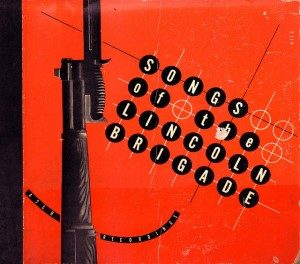
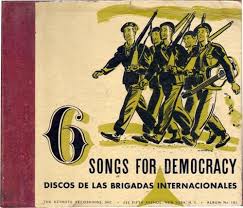
Side by side comparison of “Songs of the Lincoln Brigade” and “6 Songs for Democracy”, published by Smithsonian Folkways Recordings and Keynote Recordings, respectively (Glazer).
Fisherman’s Legacy – Then and Now
A few years after Fishman returned from the war, when countries had stopped stigmatizing the notion of being a community, socialist, any person in favor of a truly equal society, etc, Fishman had started getting the respect and recognition that was initially due to the veterans of the Abraham Lincoln Brigade. However, while his life was dearly celebrated in his remaining years, many still questioned the reason for his enlistment when the answer was there all along – Mosess “Moe” Fishman, influenced by his communist roots, did not stand to watch a nation be overtaken by fascism, and in true communist manner, put his passion into action by choosing to fight for the cause he believed in.
.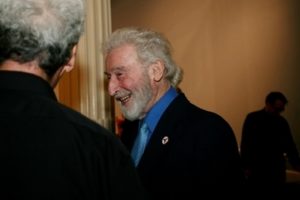 Mosess “Moe” Fishman in the year 2000.
Mosess “Moe” Fishman in the year 2000.
Citations
“Fishman, Moses | The Abraham Lincoln Brigade Archives”. The Abraham Lincoln Brigade Archives, 2007, https://alba-valb.org/volunteers/mosess-moe-fishman/. Accessed 18 Dec 2020.
“Moe Fishman, Lincoln Brigade Veterans Leader, 92 | Amnewyork”. Amnewyork, 2007, https://www.amny.com/news/moe-fishman-lincoln-brigade-veterans-leader-92/. Accessed 16 Dec 2020.
Glazer, Peter. “Songs Of The Spanish Civil War: The New Edition – The Volunteer”. The Volunteer, 2014, https://albavolunteer.org/2014/09/songs-of-the-spanish-civil-war-the-new-edition/. Accessed 18 Dec 2020.
Martin, Douglas. “Moe Fishman Dies At 92; Fought In Lincoln Brigade”. Nytimes.Com, 2017, https://www.nytimes.com/2007/08/12/nyregion/12fishman.html. Accessed 18 Dec 2020.
Military Reviewer. “One Of The Rifles Of The Spanish Civil War. “Swan Song” Rifle Steyr-Kropachek …”. Военное Обозрение, 2017, https://en.topwar.ru/108928-odna-iz-vintovok-grazhdanskoy-voyny-v-ispanii-lebedinaya-pesnya-vintovki-shtayer-kropachek.html. Accessed 18 Dec 2020.

